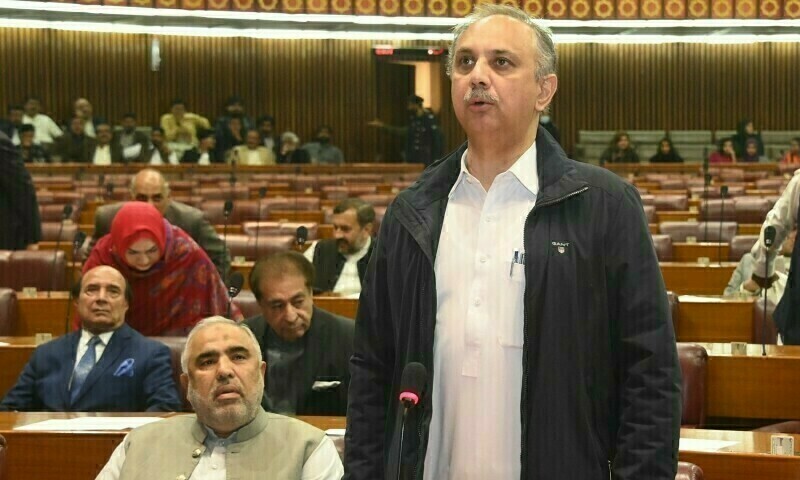
[ad_1]

A National Assembly session was adjourned indefinitely on Tuesday after Opposition Leader Omar Ayub Khan’s remarks on last night’s swift legislation were expunged from the record.
Shortly after the session began, Ayub, representing the PTI-led opposition, criticised the steamrolling of six bills a day ago, calling it a “shameful incident” and branding the ruling coalition a “government of thieves”.
Deputy Speaker Mir Ghulam Mustafa Shah promptly intervened, ordering the remarks removed from the record.
The government had passed crucial legislation — pertaining to the higher judiciary and the tenure of the services chiefs — through both houses of the parliament on Monday, despite vociferous protest by the PTI-led opposition.
Following Ayub’s remarks, the livestream on the NA’s YouTube channel then went blank, before being removed from the platform altogether. The livestream on PTV Parliament’s YouTube channel also stopped showing the session as soon as Ayub began his speech.
The NA livestream then resumed at 11:48am, before the session was adjourned indefinitely.
Shah said NA Speaker Ayaz Sadiq had yesterday spoken of giving the floor to PTI Chairman Gohar Khan but the proceedings had to be held amid noisy protests.
The deputy speaker then ordered that Ayub’s mic be turned on, but the livestream was again cut off as soon as the PTI MNA started speaking.
The livestream then resumed when independent MNA Aurangzeb Khan Khichi, one of the PTI-backed lawmakers to vote in favour of the 26th Amendment, was given a chance to speak.
Govt steamrolls bills on SC, services chiefs
The six bills were passed from the National Assembly on Monday within 24 minutes, and then from the Senate in just 16 minutes, without allowing any debate.
They sought to extend the tenure of the chiefs of the country’s three armed forces and increase the number of judges in the Supreme Court and the Islamabad High Court (IHC).
Late-night media reports suggested that Acting President Yousuf Raza Gillani had signed all six bills into law, but there was no official word from the Presidency until going to press.
In light of the ‘Supreme Court Number of Judges (Amendment) Bill 2024’, the number of judges, including the chief justice, in the apex court has increased from 17 to a maximum of 34.
Similarly, through the ‘Islamabad High Court (Amendment) Bill 2024’, the number of judges there has increased from nine to 12.
The bills regarding the judiciary were tabled in both houses by Law Minister Azam Nazeer Tarar, while those related to the services chiefs were introduced by Defence Minister Khawaja Asif through supplementary agendas, after suspending the rules.
No debate allowed
As soon as the law minister introduced the first bill related to the number of SC judges and highlighted some salient features, NA Speaker Ayaz Sadiq gave the floor to PTI Chairman Barrister Gohar Ali Khan.
But the minister protested, declaring that he would not allow the opposition member to speak without first giving his point of view. In an apparent effort to provoke the opposition, the minister categorically announced that he would not let Barrister Gohar speak, if the speaker did not allow him to finish his speech.
Eventually, the speaker relented and allowed the law minister to continue, telling the protesting opposition members to hear out the minister. The speaker’s action prompted a strong protest by opposition members, who started gathering in front of his dais.
The opposition lawmakers raised full-throated slogans targeting the government and Prime Minister Shehbaz Sharif, who was surrounded by several treasury members to avert any possibility of physical contact.
The members also tore up the copies of the bills and agendas and tossed them in the air.
At one point, Information Minister Ataullah Tarar was seen exchanging hot words with PTI’s Shahid Khattak when the former started replying to slogans raised by opposition members.
Salient features of the six bills
Changes to Army, Air Force and Navy acts
-
Tenure of all three services chiefs (chief of army staff, chief of air staff and chief of naval staff) to be five years, instead of three.
-
Retirement age bar of 64 years (for generals, air chief marshals and admirals) won’t apply to these three functionaries; extensions, re-appointments for these posts (if any) will also be for five years.
-
Tenure of Chairman Joint Chiefs of Staff remains unchanged, at three years.
Changes to SC Practice & Procedure Act
-
Three-member body to fix cases reconstituted to include CJP, senior-most SC judge and senior judge of constitutional benches.
-
Three-member committee comprising senior judge of constitutional benches and next two most senior judges to decide — through speaking order — whether matter falls within purview of constitutional bench, or not.
-
Unless required by law, every matter before SC to be heard on ‘first in, first out’ basis, ie in chronological order.
Changes to number of judges
-
Strength of IHC raised from nine to 12 judges.
-
Maximum strength of SC raised to 34 judges, including the CJP.
[ad_2]
Source link






